FESTIVALS IN BULGARIA
Bulgaria is well-known for its rich folklore and traditions, some of which thousands of years old, dating back to the times of the Thracians. The ethnographic variety of the local dances and costumes, as well as the unique uneven measures of the Bulgarian folk music, makes the country an attractive destination for art and cultural tours from all continents.
Most local rites have been well preserved during the centuries and are presented in different regions of the country, through festivals and meetings all year long.
KOPRIVSHTITSA
The festival takes place in August, every 5 years, in the small mountain town of Koprivshtitsa. This is the biggest folklore event on the Balkans, which attracts hundreds of thousands of people for each of its editions since the beginning in 1965.
The concept of the event is to gather and present self-managed authentic groups, which perform unique patterns of Bulgarian folklore, including dances, songs, music instruments, costumes, masks, etc. The last edition of the festival presented over 13 000 performers from all ethnographic regions of Bulgaria and welcomed nearly 200 000 guests from the country and abroad (USA, Australia, Japan, Great Britain, etc.).
The length of this folklore meeting is usually 3 days. Performances take place on numerous open-air stages in the outskirts of Koprivshtitsa all day long. Guests of the festival most commonly use the camping area around the town for their stay there. The municipality of Koprivshtitsa offers certain number of hotels and guest houses, but during the days of the festival they can only accommodate guests with early bookings.
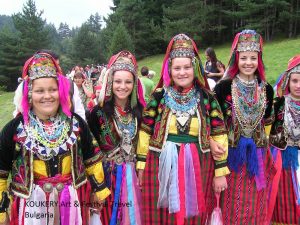
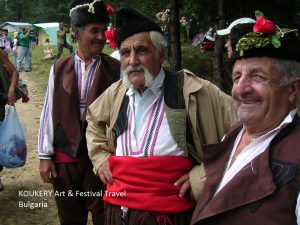
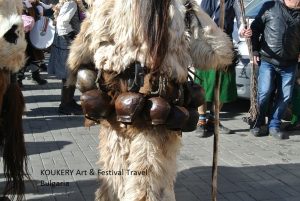
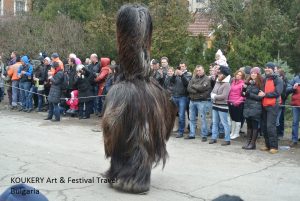
KOUKERY CARNIVAL
Koukery is a local pagan tradition, dating back to the times of the Thracians (2000 BC). The celebrations of this rite take place at the end of the winter and are believed to bring health and fertility. The tradition of these masquerade games is of Thracian origin and is closely related to Dionysus, the Thracian god of wine, fertility and rebirth.
The Koukery are masked men, who perform ritual dances around the villages and chase the evil spirits away. They are usually costumed in furs, wear scary masks on their heads, resembling animals like goats, rams, bulls, chickens, etc. They have huge copper bells, hanging on their belts around the waists, and make incredible noise, which scares the evil spirits away.
The tradition of the Koukery dances nowadays is well preserved and can be seen during the Koukery carnivals in several Bulgarian towns. The oldest and most spectacular of all Koukery festivals is the one in the town of Pernik, near Sofia. The event takes place every year in the last weekend of January, since 1966, and hosts numerous performers from different regions of Bulgaria and the neighboring Balkan countries. The town of Pernik is since 1995 a full member of the International Federation of Carnival Cities.
NESTINARI- FIRE DANCING
Nestinarstvo (fire dancing) is a unique fire ritual, performed only in several villages in Strandja Mountain, southeast Bulgaria, very close to the Black Sea coast. The tradition of the nestinari dances has an essential place in the Bulgarian folklore. It dates back to Thracian times, similar to the Koukery carnival games, and is one of the oldest pagan customs, which can still be observed in Bulgaria. Nowadays this tradition has mixed with the Christianity and the fire-dancers perform some religious rituals along with their dance. The Orthodox Church though, denies any relation to this rite and for centuries has persecuted the nestinari, believing they were possessed by the devil.
The dance of the nestinari (fire-dancers) is a mystic ritual, in which people dance barefoot in burning ember, accompanied by a traditional hypnotic melody, produced by the sacred drum and the bag-pipe. The nestinari are believed to perform their ritual dance in a state of a trance, which they reach when listening to the melody. For most observers this is the reason why their feet never burn and they don’t feel any pain.
The nestinari dancing is since 2009 part of UNESCO’s list of non-material world cultural heritage.
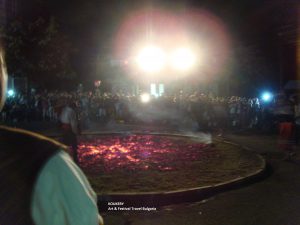
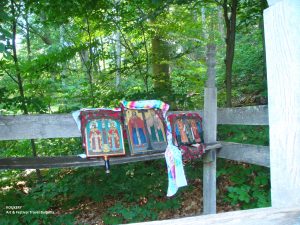
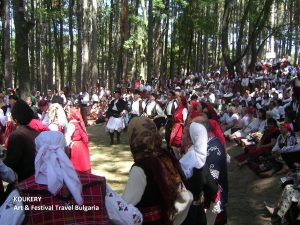
ZHERAVNA- FESTIVAL OF THE NATIONAL COSTUME
The event takes place every year at the end of August in the small museum village of Zheravna. During the festival participants and guests wear national costumes of any kind. The concept is to make people feel the atmosphere of the past, by ignoring any connection to modern life- it is forbidden to use mobile phones and cameras on the area of the festival, as well as to wear hats, sun glasses, bags, watches, etc. Guests participate in all music and dance performances, and enjoy the traditional “old-style” food, prepared directly in front of them.
THE BULGARIAN BAG-PIPE FESTIVAL IN GELA
Every year in the beginning of August the beautiful Rhodopi Mountain hosts hundreds of Bulgarian bag-pipe players. The small village of Gela, located in the most picturesque part of the mountain, a short distance away from Shiroka Laka, becomes a stage for this spectacular meeting, where visitors can enjoy the hypnotic sounds of the Kaba Gaida- folklore instrument, a type of bag-pipe, traditional for the area of the Rhodopi Mountain. Part of this unique folklore experience is the performance of the famous Bulgarian 100 Kaba Gaidi, highlight of the event.
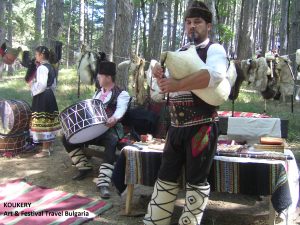
STRANDJA FOLK SONG AND DANCE CONTEST
The festival takes place in June every four years in the small village of Gramatikovo, located in Strandja Mountain, South-East Bulgaria. First organized in 1960, the meeting continues gathering thousands of people for each of its editions. Performers present authentic Bulgarian folklore and show their best talents in song and dance, as the event has a competitive character. The next Strandja Folk Song and Dance Contest will be in June 2015.
PIRIN FOLK SONG AND DANCE FESTIVAL
The festival is organized annually in the end of July, beginning of August, by several municipalities in Pirin Mountain (South West Bulgaria). It is one of the biggest folklore meetings on the Balkans and gathers groups as well as national folklore ensembles, which perform the authentic Bulgarian folk art. Concerts are arranged on open-air stages in different towns and villages in Pirin Mountain, giving visitors the chance to explore the area during the festival.
INTERNATIONAL JAZZ FESTIVAL IN BANSKO
Beside the numerous folklore festivals, Bulgaria hosts a lot of international cultural events, focusing on art, classical music, world dances, etc.
The Jazz festival in Bansko takes place every year in the beginning of August since 1998, and welcomes numerous performers and guests from all over the world. The small town of Bansko, located between two beautiful Bulgarian mountains, Pirin and Rila, offers its open-air stages, creating the best atmosphere for music lovers, to enjoy the magic of jazz…
